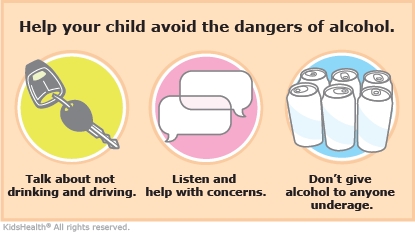Alcohol Poisoning: How to Care for Your Teen
Alcohol poisoning happens when someone drinks more alcohol than their body can handle. This can make them throw up, pass out, have trouble breathing, develop very low blood sugar, or have seizures. Sometimes it can be life-threatening. Health care providers treat alcohol poisoning with IV (given into a vein) fluids and sometimes medicines.
You can help your teen make good decisions by talking to them about the dangers of alcohol use, setting clear rules and consequences for alcohol use, and making responsible decisions yourself involving alcohol.


Follow your health care provider's instructions for:
-
how long to wait before it's safe for your teen to drive (Make sure your teen doesn't drive before then.)
-
scheduling a visit with a counselor or therapist, if recommended
Talk openly and calmly about the dangers of alcohol:
-
Share your own feelings and family values about substance use.
-
Teach your teen never to drive after drinking and never to ride with someone who has been drinking.
-
Calmly talk with your teen about the risks of alcohol use, such as:
-
Drinking at a young age can lead to alcohol problems or addiction later.
-
Teens who drink are more likely to be sexually active earlier and to have unprotected sex.
-
Teens who drink are more likely to have problems in school.
-
Drinking can hurt athletic performance.
-
Drinking before age 21 is illegal.
-
Drinking can lead to long-term brain changes.
Handle alcohol responsibly:
-
Set a good example. If you drink around your kids, be aware of how they may see you when you're drinking. Do not drive after drinking or promote drinking to your teen.
-
Don't give alcohol to teens. Teens whose parents give them alcohol are more likely to abuse alcohol.

You are:

Your child has any of these symptoms of possible alcohol poisoning:
-
repeated vomiting
-
trouble waking up or staying awake
-
shallow or slow breathing
-
seizures
-
skin that looks blue, grey, or pale

How do I know if my teen is drinking? Talking openly with your teen about drinking will help them be honest with you. Many teens will experiment with alcohol. But your teen might have a problem with drinking if they're missing school; doing worse in school than expected; getting in trouble at school or at home; withdrawing from family and friends; or losing interest in school, sports, or other activities they used to enjoy.
What should I do if I think my teen has a drinking problem? Calmly talk to your teen about your concerns. Talk to your doctor about options.
You can also find support and help online:
-
Alcoholics Anonymous helps drinkers of all ages. You also can search for local and teen-specific meetings: aa.org
-
SAMHSA: 800-662-HELP (4357) or samhsa.gov
-
Partnership to End Addiction has info on addressing alcohol and underage drinking: drugfree.org